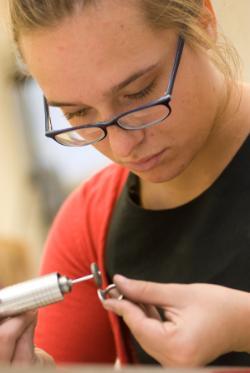
Student Resources
FAQ

Do I need to submit a portfolio of work to be admitted to the program?
No. If you are accepted to Longwood, you are admitted into the art program.
What degree does the art department offer?
The art department offers a Bachelor of Fine Arts Degree (BFA).
Does the art department offer scholarships?
Yes. The art department offers a number of scholarships which are awarded in the spring semester of each year.
Do I need to declare an area of concentration (design in crafts, art education, photography, etc.) when I enroll in the art program?
No. All freshman art majors take the same courses. Art students do not start a specific concentration until the sophomore year.
Can I change my area of concentration?
Yes, although a change of concentration may affect your graduation date.
When are classes offered/will I be able to take a certain class X semester?
Certain classes are offered every semester, while others are only available on a rotating basis.
- Course Rotation (pdf)
How many classes will I take each semester?
The normal class load is 15-16 credit hours (five classes)
What art courses will I take my freshman year?
All art majors take 2-D Design, Drawing 1, 3-D Design, Life Drawing and two art history survey courses during the freshman year.
How much will I spend on art materials??
Approximately $500-$1,000 per year.
Where do I purchase my art supplies?
Usually a combination of places. Many students purchase art supplies while at home, some order online and some buy their materials locally.
What kind of computer will I need when I enroll as an art major at Longwood?
Most studio art majors use Apple laptops ("Macs"), which are the standard in the visual arts.
What kind of technical support is available if my computer breaks?
Longwood has good basic, support for the Macs. More serious problems may require that the computer be serviced in Richmond. Properly cared for, Macs don't experience many problems.
What kinds of internships are available to art majors?
All art majors are required to complete research directed by faculty resulting in a project presented in the spring of the senior year. Some students also seek out internships, usually during the summer. Students can receive academic credit for those internships.
What are the mandatory portfolio assessments?
Prior to Spring Break of each year, art students meet formally with faculty in small groups to present and discuss their current creative work. Faculty evaluates the progress if each student and recommend successful students for advancement to the next level of his/her concentration.
Does the art department offer study abroad opportunities?
Yes, special topics courses are periodically taught by various faculty members providing students with a first-hand opportunity to gain in-depth awareness of the great works of art, architecture, and design which stand as visual expressions of the spiritual aspirations and intellectual achievements of Western and Non-Western cultures.
Does the art department offer academic advising?
Every art student is assigned an academic advisor. These advisors are art faculty, usually in the student's area of concentration. Your advisor is the best person to contact regarding general academic questions or problems regarding a course you are taking, see the professor who teaches the course as soon as possible.
Do Longwood art graduates find jobs?
Yes, the majority of arts graduates will find creative work in non-arts, related fields. A strong portfolio, an engaging personality, willingness to relocate and a thorough, aggressive job search all play important roles in obtaining employment. At Longwood, a BFA in art or art education prepares students to be successful in the workplace by instilling attributes that employees consistently want when hiring college graduates. Students are given the tools to be responsible citizens that can navigate well in a challenging world. The art faculty is committed to ensuring undergraduates receive an education that includes formal and technical skills relevant to the student's field of study. Specific areas of competence embedded in the BFA program's curriculum include the following: critical thinking and analysis, the ability to communicate clearly and effectively, technical mastery of relevant tools and materials, research skills, the expertise necessary to demonstrate and present work in a professional manner. Your studies will give you a firm foundation for building a successful future.
